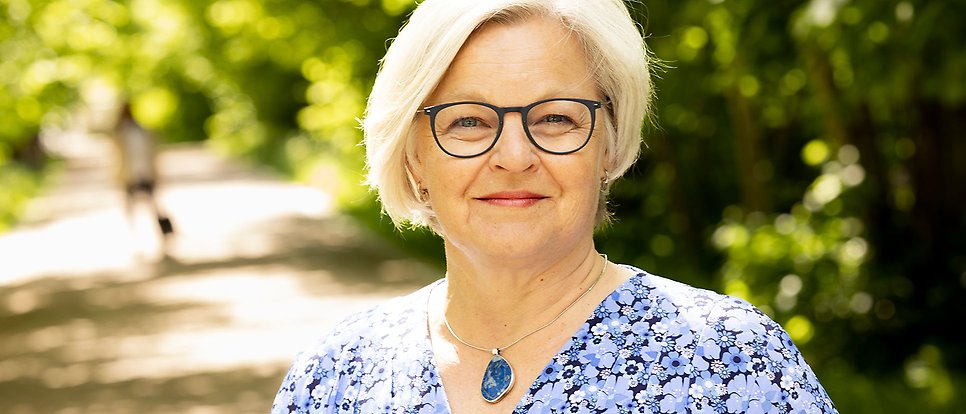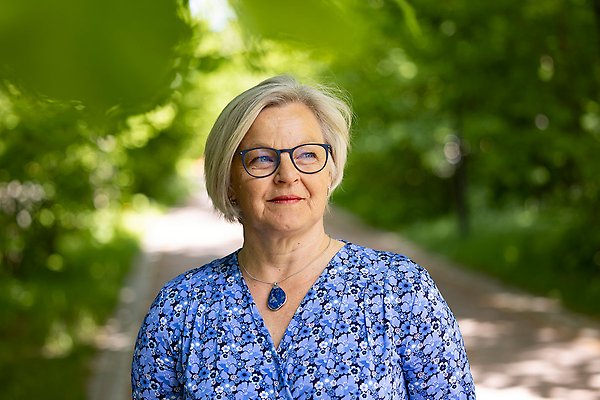Behavioural medicine used to treat chronic pain

Pernilla Åsenlöf’s line of research has contributed to Uppsala University now having a physiotherapy programme with a behavioural medicine specialisation. Photo: Mikael Wallerstedt
Chronic pain is a global public health challenge that affects large groups of patients and carries a high cost in terms of both human suffering and society’s healthcare resources. Pernilla Åsenlöf, Professor of Physiotherapy, researches how tailored treatment using behavioural medicine can help people with severe pain issues regain a functioning working and everyday life.
“Pain is an invisible disease suffered by a large part of the population, so we need to do everything we can to improve the quality of life for these people, even when there is no cure,” notes Åsenlöf.
U-PAIN is a multidisciplinary research programme with a strong connection between research and healthcare that forms part of a collaboration with the Pain Centre at Uppsala University Hospital. 400 patients are being studied based on social, behavioural and biological circumstances with the aim of understanding who is at risk of developing substance use disorder from pharmacological treatment using opioids and who may benefit from opioids, for example in terms of their ability to work.
“Current treatment methods are often inadequate and pain medication can cause problematic side effects,” explains Åsenlöf. “But when no treatment helps the patient, instead of giving up we must combine new approaches and methods to develop new ways to help the patient live a good life.”
Studying both the risks and benefits of long-term opioid treatment is an important but also controversial issue in healthcare.
“The hope behind U-PAIN is that by using new knowledge and methods, we can gain a more nuanced understanding of risk profiles, identify the impact of lifestyle habits and see how we can improve individualised treatment,” continues Åsenlöf. “We want to understand who is affected by substance use disorders in cases of chronic pain and how they can be alleviated or even cured in the future.”
Tailor-made treatments
Åsenlöf was one of the pioneers of integrating physiotherapy into the field of behavioural medicine. She moved from Småland to Uppsala as a young woman and trained as a physiotherapist. The inter- and multidisciplinary nature of her doctoral studies was reflected early on in her research career. Her doctoral studies were at the intersection of physiotherapy and psychology, which created the launch pad for developing physiotherapy as a discipline using knowledge from behavioural medicine.
“I was privileged to be in a stimulating environment that was home to many different professions, medical sciences and social sciences. That had an influence on me and my research career,” continues Åsenlöf. My supervisor, the psychologist Per Lindberg, gave me fantastic help in developing my own thoughts around goals, learning and the importance of behavioural activation. This new knowledge was then able to be developed into new treatment methods for physiotherapy.”

Many people suffer from chronic pain and we need to improve the situation/quality of life for these patients, says Pernilla Åsenlöf. Photo: Mikael Wallerstedt
Daring to conduct randomised studies using new, and at that time somewhat controversial, treatment methods was novel among physiotherapy activities in primary care. The studies led to a new working model in behavioural medicine whereby the patient’s own highly valued goals formed the basis for training new behaviours and mindsets. Combined with individualised physical training, this proved to be an effective way to increase the capacity for activity and reduce pain in patients.
“In my clinical practice, I met many patients with chronic pain,” explains Åsenlöf. “My research idea was based on patients’ individual circumstances, goals and wishes instead of pinpointing and relieving symptoms of various issues, which was a common focus at the time. We tailored treatments early on and worked with each individual’s unique profile.”
Unique physiotherapy training
Åsenlöf's line of research has contributed to Uppsala University now running a physiotherapy programme with a focus on behavioural medicine. This is a unique approach that has attracted the interest of many universities around the world.
“Our students learn to work in an integrated manner on medicine and psychology,” says Åsenlöf. “It’s a matter of how to teach and maintain health-promoting behaviours, whether that means working on prevention or caring for the seriously ill. Students will be equipped to meet the challenges faced by physiotherapists in today’s society.”
Work-related rehabilitation
Physiotherapy is a broad field of application. With an increasing number of doctoral students in the research team, studies have been carried out on topics such as obstructive sleep apnoea, obesity, cancer, whiplash injuries, chronic and acute pain, and pain in children and adolescents.
“We have also adapted the treatment for work-related rehabilitation,” says Åsenlöf. By going to workplaces and simultaneously training both the supervisor and the patient with pain, we want to facilitate the return to work after a period of sick leave.
“This inspires me to urgently challenge myself to make a difference to individuals affected by chronic, difficult-to-treat conditions, but also to work alongside both wise and experienced colleagues and in particular young colleagues who have so much to offer.”
Young women’s mental health
Mental ill health is on the rise in Sweden and other countries. Due to her leadership and experience in bringing together researchers from different disciplines, Åsenlöf was appointed to lead the UPIC research programme, which addresses the challenge of understanding and preventing mental ill health among young women.
“Every day we see alarming figures about young women in society who, by definition, do not suffer from serious psychiatric illness but are still feeling bad and suffering from mental ill health,” notes Åsenlöf. “This is a long-term study and an important societal challenge for us researchers to address.”
The research programme combines traditional knowledge, theories and methodologies from different disciplines. The aim is to build a national lifetime cohort to understand, among other things, what contributes to and what protects young women from mental health problems.
“These young women – as well as the men – are our future. We need to understand how we can stimulate health-promoting contexts for those who need them in good time before things become serious, and not medicalise things that require interventions in other social arenas than healthcare, for instance,” concludes Åsenlöf.
Cecilia Yates
